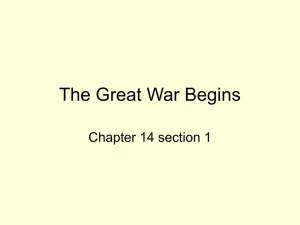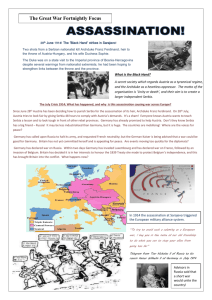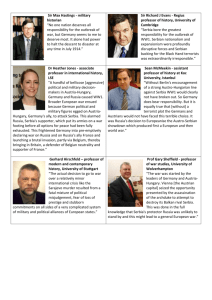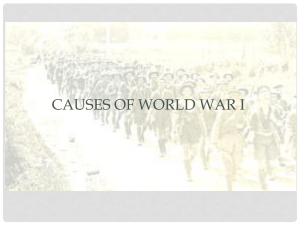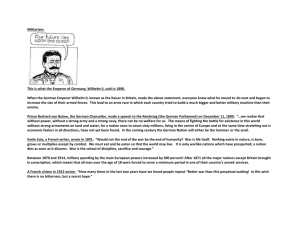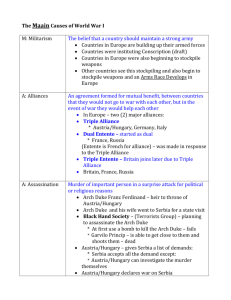Article 231 of the Treaty of Versailles, which had been imposed by
advertisement
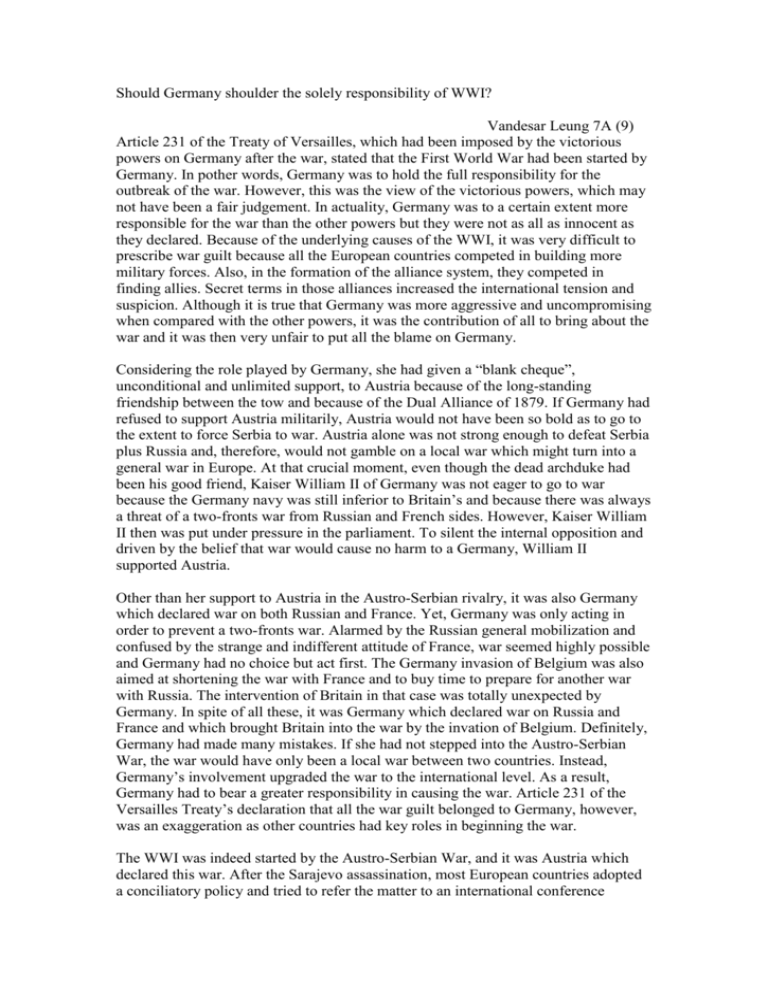
Should Germany shoulder the solely responsibility of WWI? Vandesar Leung 7A (9) Article 231 of the Treaty of Versailles, which had been imposed by the victorious powers on Germany after the war, stated that the First World War had been started by Germany. In pother words, Germany was to hold the full responsibility for the outbreak of the war. However, this was the view of the victorious powers, which may not have been a fair judgement. In actuality, Germany was to a certain extent more responsible for the war than the other powers but they were not as all as innocent as they declared. Because of the underlying causes of the WWI, it was very difficult to prescribe war guilt because all the European countries competed in building more military forces. Also, in the formation of the alliance system, they competed in finding allies. Secret terms in those alliances increased the international tension and suspicion. Although it is true that Germany was more aggressive and uncompromising when compared with the other powers, it was the contribution of all to bring about the war and it was then very unfair to put all the blame on Germany. Considering the role played by Germany, she had given a “blank cheque”, unconditional and unlimited support, to Austria because of the long-standing friendship between the tow and because of the Dual Alliance of 1879. If Germany had refused to support Austria militarily, Austria would not have been so bold as to go to the extent to force Serbia to war. Austria alone was not strong enough to defeat Serbia plus Russia and, therefore, would not gamble on a local war which might turn into a general war in Europe. At that crucial moment, even though the dead archduke had been his good friend, Kaiser William II of Germany was not eager to go to war because the Germany navy was still inferior to Britain’s and because there was always a threat of a two-fronts war from Russian and French sides. However, Kaiser William II then was put under pressure in the parliament. To silent the internal opposition and driven by the belief that war would cause no harm to a Germany, William II supported Austria. Other than her support to Austria in the Austro-Serbian rivalry, it was also Germany which declared war on both Russian and France. Yet, Germany was only acting in order to prevent a two-fronts war. Alarmed by the Russian general mobilization and confused by the strange and indifferent attitude of France, war seemed highly possible and Germany had no choice but act first. The Germany invasion of Belgium was also aimed at shortening the war with France and to buy time to prepare for another war with Russia. The intervention of Britain in that case was totally unexpected by Germany. In spite of all these, it was Germany which declared war on Russia and France and which brought Britain into the war by the invation of Belgium. Definitely, Germany had made many mistakes. If she had not stepped into the Austro-Serbian War, the war would have only been a local war between two countries. Instead, Germany’s involvement upgraded the war to the international level. As a result, Germany had to bear a greater responsibility in causing the war. Article 231 of the Versailles Treaty’s declaration that all the war guilt belonged to Germany, however, was an exaggeration as other countries had key roles in beginning the war. The WWI was indeed started by the Austro-Serbian War, and it was Austria which declared this war. After the Sarajevo assassination, most European countries adopted a conciliatory policy and tried to refer the matter to an international conference hoping to settle the incident peacefully instead of resorting to war. However, Austria’s demands in the ultimatum clearly illustrated that she was provoking Serbia to war as her third request, that Austrian observers were to be sent to Serbia to make sure that the first two demands were fulfilled, violated the sovereignty of Serbia. When Serbia then tried to pacify Austria’s anger by accepting the first two demands, to suppress the anti-Austrian secret society in Bosnia-Herzegovina and to dismiss the officials to whom Austria objected, Austria used the excuse that “Serbia refused to accept the ultimatum” to declare war on Serbia. Nevertheless, the Austrian heir-apparent had been killed by an anti-Austrian secret society in Bosnia, which had been financed by the Serbian government. Though the Serbian government might not have been directly involved in the assassination, she was still responsible. In the other way round, if the murdered one was not Archduke Ferdinand but the king of Serbia, Serbia might also do the same on Austria. Thus, though the Austro-Serbian War might have been prevented by an international arbitration as suggested by Britain, who was going to sacrifice Serbia to satisfy Austria, Austria still could have turned down any decision. At the same time, Austria wanted to use this chance to defeat Serbia once and for all because Serbia’s ambition to unify with Bosnia-Herzegovina and those Serbs in Austria-Hungary posed a great threat to the multi-racial empire of Austria. So, in order to eliminate the enemy and to ensure internal stability, war was a must to Austria. In this sense, Austria should bear part of the war guilt. In effect, the Sarajevo assassination was the immediate cause of the First World War and the result of the long-standing hostility between Austria and Serbia. They had been bitter enemies since the Congress of Berlin of 1878, which had put BosniaHerzegovina under the indirect administration of Austria. Their rivalry was strengthened when openly annexed the two places in 1908. Afterwards, Serbia often looked for chances to fight back. It was this revenge psychology that drove Serbia to sponsor the anti-Austrian movement in Bosnia-Herzegovina, which, in turn, led to the murder of Archduke Ferdinand on 28th June 1914. From this point of view, Serbia was also responsible for the outbreak of the First World War. Notwithstanding, Serbia had hated Austria deeply for a long time, but was not prepared to go to war with Austria. Even after the Sarajevo assassination, she no intention of going to war with Austria because she was not ready for it. Serbia had taken part in both the First (1912) and Second Balkan Wars (1913), which had drained many of her resources and much of her manpower, and needed time to recover and to consolidate her control over the newly territories during the two wars. As a result, she was not in a good position to go to war so soon in 1914, but she was still partly responsible for the war. Russia also bears the responsibility of the war because the general mobilization of her armies aroused German suspicions and provided Germany with an excuse to declare war. In this sense, the Austro-Serbian War was widened by the Russian mobilization. Furthermore, Serbia had been under her support to organize the anti-Austrian activities in the Balkan Peninsula, which led to the Sarajevo assassination in 1914. So, she had to bear the responsibility of the murder of the murder of the Austrian archduke, too. Moreover, the Pan-Slavism of Russia also inspired the Greater Serbian Movement in the Balkans and encouraged the ambition of Serbia. Without the support of Russia, Serbia might have been satisfied with the territories that she had earned in the two Balkan wars of 1912 and 1913 and might not have dared to challenge Austria in Bosnia-Herzegovina so shortly after the two wars. To Russia, Serbia was only a stepping-stone to extend herself to Western Europe. In addition, Serbia was Russia’s only ally in the area. As a result, Russia had to support Serbia at all costs and it was this role that Russia played in the Balkans together with her mobilization on 30th July 1914 that “earned” she part of the guilt of causing the war. France’s attitude towards war was very unclear throughout the whole development (between the Sarajevo assassination and the outbreak of the First World War) because she refused to clarify her position to Russia and Germany after the Sarajevo assassination. The president of France’s promise to support Russia during his visit to Russia was seemingly an unwilling decision because he had refused to declare his support to Russia openly when Russia had asked for it earlier. And when Germany sent France an ultimatum asking she to clarify her position in case of a war between Russia and Germany, again the French government announced no response. French was also the last one, besides Britain, to mobilize her troops. Despite all this, France was still unable to escape to escape from any war guilt. She had signed the FrancoRussian Alliance in 1894 in which she had promised to aid Russia militarily in case of any attack from Germany and again promised to keep this previous pledge shortly before the outbreak of the First World War. French support to Russia caused the latter to openly support Serbia and more welcome to come to a showdown with Germany. Lastly, Britain attempted to put pressure on the other powers to settle the AustroSerbian dispute by holding an international conference. But although she had made efforts towards finding a peaceful solution to the Sarajevo assassination, she never insisted. If she had seriously insisted on this point, the First World War might have been prevented or at least confined to the level of a local war between Austria and Serbia. Instead of pressing others to give up the idea of war or remaining neutral all along the way, however, Britain declared war on Germany immediately after the German invasion of Belgium. Her reaction was so fast and so ready-made that it seemed Britain had been well prepared to fight Germany even before Belgium was invaded by Germany. From this point of view, Britain might have entered the war even without the intrusion of Belgium in order to destroy the German navy and to uphold the balance of power in the Balkans and in Europe. As a result, Britain was not totally innocent as well. In reality, all of the powers had to share responsibility for the war with Germany and were equally blamed for the outbreak of the WWI. Though it was obvious that none of the powers involved had planned for such a large scale European war, all of them welcomed the war when it came. None of the powers tired hard to prevent this final showdown because they had been subjected to international tension, suspicion and rivalry for a long time. Everyone expected war and both the rulers and their people had prepared for it. Viewing the war from this angle, though Germany played the biggest role in causing the WWI, all the participants had a part in it.
